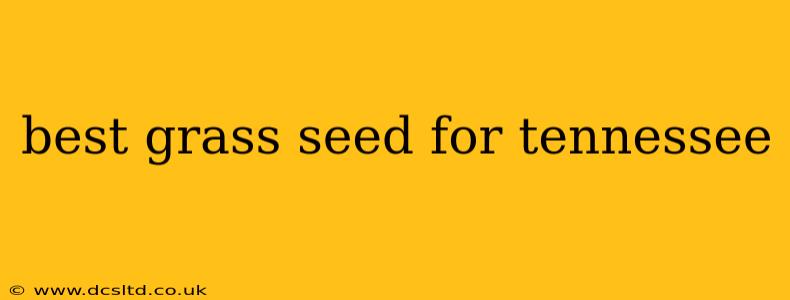Choosing the right grass seed can make all the difference in achieving a lush, healthy lawn in Tennessee. The state's diverse climate, ranging from the humid eastern regions to the drier western areas, necessitates careful consideration of several factors before selecting your seed. This guide will help you navigate the options and find the best grass seed for your specific Tennessee landscape.
What are the different types of grass seed?
Tennessee's varied climate zones support several grass types, each with its own strengths and weaknesses. The primary choices typically boil down to cool-season and warm-season grasses.
-
Cool-Season Grasses: These thrive in cooler temperatures and are generally best suited for the higher elevations and northern parts of Tennessee. They go dormant in summer heat. Popular choices include:
- Tall Fescue: A highly adaptable and durable option, tolerant of shade and foot traffic. It requires less water than some other cool-season grasses.
- Fine Fescue: Ideal for shady areas and tolerates drought conditions better than tall fescue. It's often mixed with other grasses for optimal results.
- Kentucky Bluegrass: Known for its vibrant green color and fine texture, but it requires more maintenance and is less shade-tolerant than fescue.
-
Warm-Season Grasses: These grasses flourish in warmer temperatures and are better suited for the southern and western parts of the state. They go dormant in winter. Popular choices include:
- Zoysia: A low-maintenance option known for its drought tolerance and disease resistance. It's slow-growing, which means less mowing.
- Bermuda: A very aggressive and durable grass, excellent for high-traffic areas. It requires full sun and is not very shade-tolerant.
- Centipede: A good choice for acidic soils and partial shade, but it's not as drought-tolerant as Zoysia or Bermuda.
What type of grass seed is best for shade?
For shady areas in Tennessee, fine fescue is a top contender. Its tolerance of low light conditions makes it an excellent choice. You can also consider a shade-tolerant blend that combines fine fescue with other grasses suited to low-light environments. Tall fescue can also handle some shade, but it won't thrive in deeply shaded areas.
What is the best grass seed for full sun?
In full sun locations, Bermuda grass excels in Tennessee's warmer regions. Its heat and drought tolerance make it a low-maintenance choice. In cooler areas, Kentucky bluegrass, while requiring more water, can create a stunning full-sun lawn with its vibrant green color.
Which grass seed is best for high-traffic areas?
Bermuda and tall fescue are both excellent options for high-traffic areas in Tennessee. Bermuda's durability makes it ideal for areas with constant foot traffic or pet activity, particularly in warmer regions. Tall fescue, with its strength and adaptability, holds up well in cooler climates.
What are some tips for choosing and planting grass seed?
- Consider your soil type: Perform a soil test to determine the pH and nutrient levels. This will help you choose the most suitable grass type and ensure you amend the soil appropriately before planting.
- Assess your sun exposure: Note how much sunlight your lawn receives throughout the day. This is crucial in determining whether a cool-season or warm-season grass is better suited to your needs.
- Choose a high-quality seed: Look for seeds that are specifically formulated for Tennessee's climate and soil conditions. Look for germination rates on the packaging.
- Follow planting instructions carefully: Proper seeding depth, soil preparation, and watering are all essential for successful germination and establishment.
- Be patient: It may take several weeks or even months for your new lawn to fully establish itself.
By carefully considering these factors and selecting the appropriate grass seed, you can cultivate a beautiful and healthy lawn that thrives in your Tennessee landscape. Remember to consult local garden centers or lawn care professionals for personalized recommendations based on your specific location and conditions.
